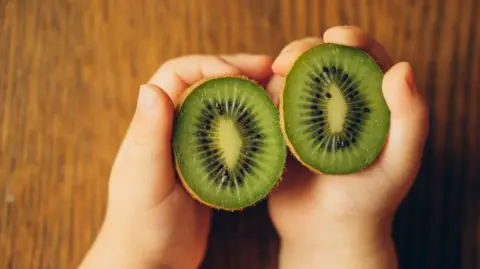Michelle Roberts
Digital health editor, BBC News

 Getty Images
Getty Images
Pesto often contains pine nuts
Allergic reactions to foods such as pine nuts and goats milk happen frequently enough they may need warning labels, say experts.
Food packaging in the UK and EU already lists the most common allergens for people to be aware of, such as egg, peanuts and sesame.
But at least four more could be added to the mandatory risk list, according to an article in the journal Clinical & Experimental Allergy.
Lead investigator Dr Dominique Sabouraud-Leclerc from the Allergy Vigilance Network said evidence of increased reactions to a wider range of foods suggested it was time to review the list of foods with mandatory labels and consider adding "at least the most severe of these emerging food allergens".
Why are food allergies on the rise?
The foods the researchers say should be added to the list now are:
- goat or sheep milk
- buckwheat
- peas and lentils
- pine nuts
And other emerging ones to keep a watch on are:
- alpha-gal, found in red meat such as beef or lamb
- kiwi
- beehive products, such as wax and pollen, as well as honey
- apple
The recommendation comes from experts who looked at food-induced anaphylaxis cases reported in Europe between 2002–2023.
Anaphylaxis is a potentially life-threatening allergic reaction that is a medical emergency.
Symptoms, such as swollen lips and throat and difficulty breathing, can happen very quickly.
People who know they are allergic to certain foods can carry an adrenalin auto-injector pen in case they need urgent treatment.

 Getty Images
Getty Images
Some people are allergic to kiwi fruit and may get symptoms such as a tingling mouth if they eat it
The researchers analysed nearly 3,000 cases and 413, including two deaths, were caused by one of the eight emerging food allergies.
Based on their frequency, severity, recurrence, and potential for hidden exposure, the top four new ones are goat's and sheep's milk, buckwheat, peas and lentil, and pine nuts.
That would put them in the same list as the current 14:
- cereals containing gluten - wheat, rye, barley, oats.
- crustaceans - crabs, prawns, lobsters
- eggs
- fish
- peanuts
- soybeans
- milk
- nuts - almonds, hazelnuts, walnuts, cashews, pecan nuts, brazil nuts, pistachio, macadamia
- celery
- mustard
- sesame seeds
- Sulphur dioxide and sulphites used as a preservative (at concentrations of more than 10mg/kg or 10mg/L in terms of total sulphur dioxide)
- lupin (an ingredient in some pastas and baked goods)
- molluscs - mussels, oysters, squid, snails
The Food Standards Agency says it recognises that there are a significant number of foods that can cause allergies or intolerances.
“This is why pre-packed foods must list all ingredients, why food businesses must provide clear information about allergens and why we encourage consumers to speak up about their allergies,” said spokesman Dr James Cooper.
.png)
 3 months ago
16
3 months ago
16








 English (US) ·
English (US) ·